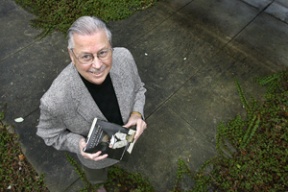A retired admiral compiles letters from troops serving in Iraq.
During a highly politicized war, it’s easy to forget about the men and women who fight it.
U.S. soldiers in Afghanistan and Iraq often go unrecognized by the American public, the stories of their struggles overshadowed by the glut of policy analysis and debate on television and radio.
Bainbridge resident and retired U.S. Navy Rear Admiral Stuart Platt hopes to turn the spotlight back on the troops, focusing on what he calls, “the human stories that fall between the lines.”
His newest book, “Letters From the Front Lines,” allows the servicemen and women – from support staff to high-ranking officers and combat soldiers – to depict their experiences in Iraq and Afghanistan in their own words, through unedited letters, emails and blogs. Platt will read selections from his book at 7:30 p.m. Jan. 11 at Eagle Harbor Book Company.
“If one believes the nightly news, it is all IEDs (Improvised Explosive Devices) and mayhem, but as a Vietnam veteran, I know there is much more to conflict than that simplistic view,” he said. “I wanted to give our men and women in uniform a voice in the historical record of our nation.”
Platt’s daughter, Elizabeth, was in Tower 1 of the World Trade Center on Sept. 11, 2001 and barely escaped the collapsing building. He cited 9/11 and the national attitude towards the soldiers as his primary motivation for putting the book together.
“ I see the troops are not chastised, but they are not praised,” he said. “When one says ‘I support our troops,’ that’s fine, but when one send them letters or thanks a soldier in person, that is more gratifying from the soldier’s perspective.”
More than most people, Platt understands a soldier’s perspective.
Platt, 73, began his career in the U.S. Navy when he was drafted for the Vietnam War at the age of 22.
A Manhattan native, Platt earned 22 medals during the conflict, but does not define his career by the war.
“Although Vietnam was my shooting war, it was 37 years ago,” he said. “I consider myself primarily a Cold War veteran.”
Platt spent much of his 31 year Navy career working directly with Admiral Hyman G. Rickover in the Naval Nuclear Propulsion Program and was responsible for the acquisition of warships and submarines in the 1980s buildup of the 600-ship Navy.
“I am proud to have helped win the most disastrous war the world has ever seen without having to fire a shot,” Platt said. “We broke the Soviets’ budget and they broke their country.”
In 1989, the admiral heeded to what he saw as a period of turnover of Navy personnel and retired from service.
“When the Berlin Wall came down there was a change in the nation,” he said. “I felt there needed to be a new generation of officers for problems we would face.”
Since his retirement, Platt has balanced a successful business career in the defense and technology industries with his writing ambitions.
“I always found it easy to put pen to paper, I just didn’t have the time” he said. “Now I have the time and a lot to say.”
Platt admitted composing “Letters From the Front Lines” was different than writing a conventional book.
The book demanded that he select from thousands of personal correspondences with an eye to telling an overarching story of the soldiers’ experiences in the foreign war.
He didn’t change the letters, but he did choose and organize them so as “to organize them to give a story about what is going on in Iraq, what the troops see and feel everyday.”
Although domestic support for the War in Iraq is waning, Platt spoke confidently of the morale and capability of the forces in Iraq and Afghanistan.
“Our troops are proud,” he said. “The letters from the front reinforce the fact that this is the finest military in our history and we owe them a great deal.
“We are caught in a culture clash,” Platt added. “We were woefully unprepared to establish a government in Iraq and we should give our troops a pat on the back. If at times they are carrying out bad policy, it does not make them bad troops.”


